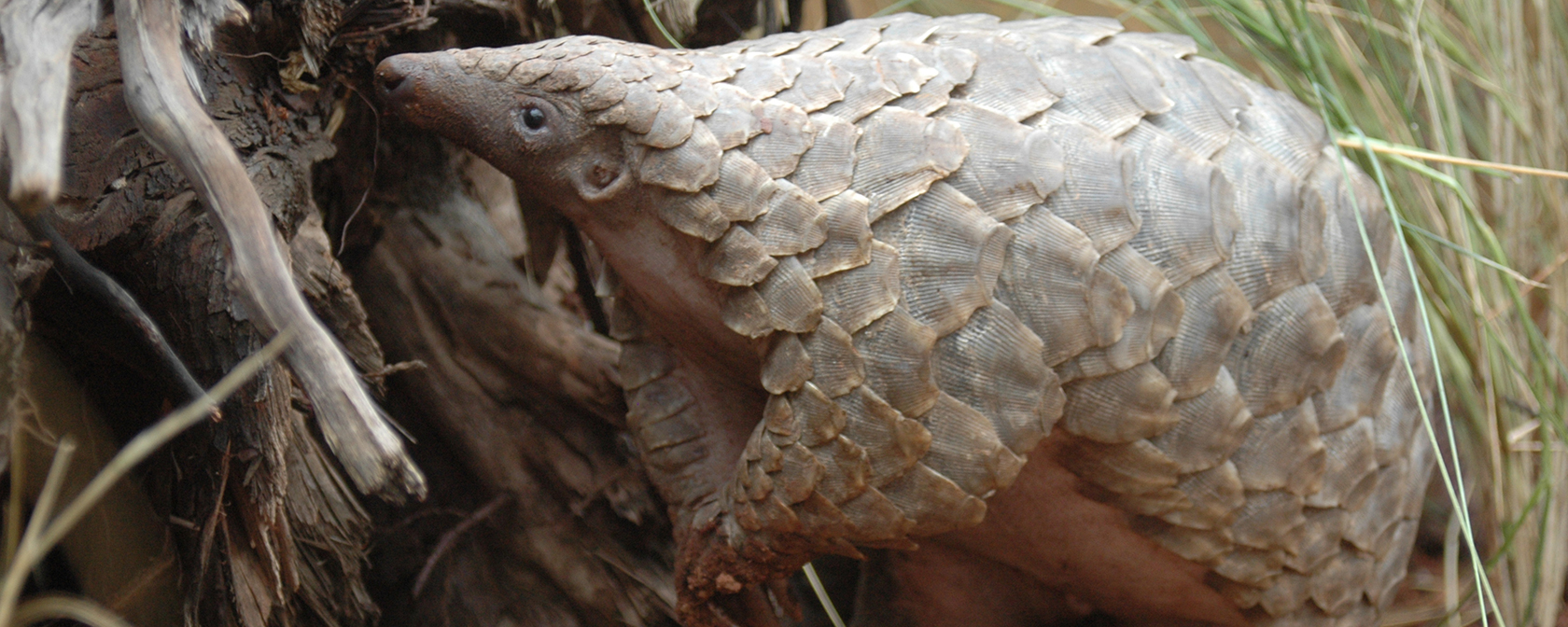By Sara Amundson and Kitty Block
Pangolins are sometimes called the “guardians of the forest” because they hold termite destruction at bay. Yet they are also the world’s most trafficked mammal, and so they bear the burden of being something of an ambassador species in the wider campaign against wildlife trafficking.
Pangolins curl themselves up into a tight ball when they feel threatened. This ball is impenetrable to natural predators, but it makes them an easy target for poachers, who can pick them up and carry them away, funneling the animals straight into the wildlife trade, where they are killed for their skins, meat and unproven medicinal treatments.
The U.S. Fish and Wildlife Service just announced its proposed listing of seven additional species of pangolins under the U.S. Endangered Species Act as endangered. These ESA protections are critical for heavily trafficked non-native species because the U.S. is a major destination and transport hub. If the remaining species of pangolins are listed, the law will forbid unauthorized “take” and unregulated trade and set the stage for additional funding support for law enforcement agencies to combat pangolin trafficking.
Demand that the Fish and Wildlife Service protect pangolins >>
After years of pangolin advocacy, we are gratified by the agency’s finding. Even though pangolins are the most trafficked mammals in the world, only one out of eight recognized species of pangolin (the Temminck’s ground pangolin) is currently listed as endangered under the ESA.
The agency’s announcement comes in response to a petition we filed and a lawsuit we brought with other organizations. We, the Center for Biological Diversity, International Fund for Animal Welfare, and others petitioned for protections for pangolins in 2015 after one of our investigations uncovered U.S.-based companies selling “medicinal” pangolin parts and products online to American customers. We have also documented pangolin scales for sale in Portland, Oregon and New York City. But it wasn’t until our lawsuit in 2020 that the Service committed to a deadline for a decision about whether these vulnerable animals should be protected.
The case for protecting pangolins is not merely strong; it’s urgent, and we have worked tirelessly to achieve that protection. In 2016, our delegation to the Convention on International Trade in Endangered Species of Wild Fauna and Flora (CITES) worked to secure the support of 183 member nations to give the highest level of protection to all eight pangolin species, banning the international commercial trade in pangolin parts. We have organized public awareness campaigns to reduce demand for pangolin parts in China and Viet Nam and supported the rescue and rehabilitation of pangolins in South Africa. In the U.S., we’ve advocated for states to end their own role in creating markets for cruel products made from the body parts of animals, and at least 10 states have enacted laws restricting the sale of pangolin parts within their own borders. Formal listing under the Endangered Species Act is the next necessary step.
Historically, the U.S. was a major importer of pangolin skins used in leather goods. In recent decades, however, the global trade of pangolin parts has shifted to scales and meat, with scales becoming the dominant product traded. Scales of Asian pangolin species, but also of African pangolin species shipped to countries in Asia, are still used in traditional East Asian medicine practices. Over the past 10 years, more than 400 tons of trafficked pangolin scales have been seized across the globe. This represents between 100,000 and 1 million individual pangolins killed for their scales. That doesn’t even count the trafficked parts and products that avoided detection from law enforcement and made it to their destination. The pangolin scale trade is so vast that some scientists believe they have identified a previously undescribed ninth pangolin species from testing the DNA of confiscated scales.
According to International Union for Conservation of Nature (IUCN) Red List assessments, each pangolin species is categorized as vulnerable, endangered or critically endangered.
Wildlife trafficking increasingly lines the pockets of transnational criminal organizations and helps them avoid repercussions for money laundering; it is also linked to drug trafficking by powerful cartels, as well as Chinese criminal operations that supply precursor chemicals for fentanyl, a drug so dangerous that just two milligrams can be fatal.
Earlier this year, President Trump signaled that he is serious about bringing down such organizations. To do so, the Trump administration must take more definitive steps to protect wildlife from traffickers. During his first term, the president issued an executive order that recognized the connection between wildlife trafficking and criminal organizations and repeatedly requested funding to invest in “law enforcement capacity to combat illegal wildlife trafficking.” In the same time frame, federal agencies brought several enforcement actions for wildlife trafficking, including cases involving big cat and rhinoceros parts. Early reporting in his second term suggests that the president remains serious about bringing an end to these crimes.
No matter what, we will continue to fight for pangolins—and all trafficked animals—to live free from cruelty. For years, we have been pushing the Service to move urgently to protect pangolins. Now we are so close.
This week’s decision opens a 60-day comment period; a final listing decision should be made within a year. This means that you can have a hand in bringing protections the world’s most trafficked mammal: Tell the U.S. Fish and Wildlife Service to act quickly to give pangolins the protections they deserve.
Kitty Block is CEO and president of Humane World for Animals.




